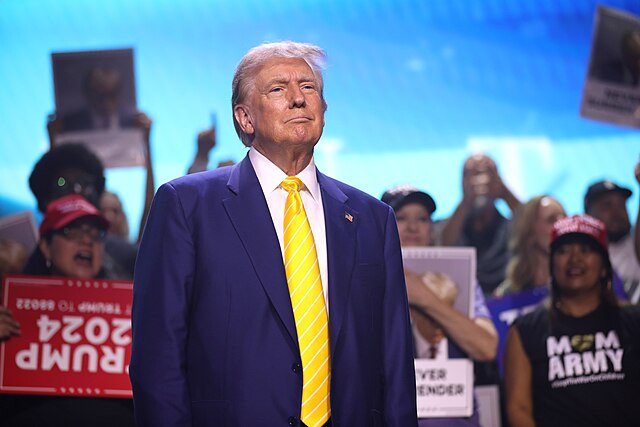Former President Donald Trump made his first visit to Capitol Hill since the January 6th attack, receiving a hero's welcome from Republican lawmakers. This visit comes less than five months before his anticipated rematch with President Joe Biden. Despite the lingering controversies from his previous tenure, the GOP showed a rare moment of solidarity, reflecting their focus on reclaiming control in the upcoming 2024 elections.
Trump's visit included closed-door meetings with both House and Senate Republicans, marking a significant event for a party that has been internally divided since the Capitol riot. Notably, Trump reconciled with Senate Minority Leader Mitch McConnell, who had publicly criticized him for his role in the January 6th attack. "It was a good meeting," McConnell said, describing the session as "entirely positive."
"It was a pep rally for President Trump," said Rep. Matt Gaetz, R-Fla., highlighting the enthusiastic support Trump received from House Republicans. With Trump and Biden neck-and-neck in polls and congressional control at stake, GOP members expressed optimism about sweeping the 2024 elections and advancing Trump's agenda.
During his meetings, Trump emphasized the importance of unity among Republicans. He offered to assist members facing tough races and urged them to avoid internal conflicts. At one point, he humorously urged Rep. Marjorie Taylor Greene, R-Ga., to get along with Speaker Mike Johnson, R-La. "Marjorie, are you being nice to Mike?" Trump asked, prompting laughter from those present.
In his remarks, Trump covered a range of topics, from border security to China, and criticized trans athletes in women's sports. He also addressed the contentious issue of abortion, acknowledging its impact on Republican electoral fortunes. Trump advocated for common-sense policies that include exceptions for rape, incest, and the life of the mother, while emphasizing that the matter is now in the hands of the states.
Reactions to Trump's comments on abortion were mixed, reflecting the ongoing debate within the party. Nonetheless, his stance reinforced his message that Republicans must handle the issue thoughtfully to avoid alienating voters.
Trump also took a swipe at Milwaukee, the host city of the upcoming Republican National Convention, calling it "horrible" and plagued by crime. His remarks went unchallenged by those in the room, underscoring his influence within the party.
As Trump arrived on Capitol Hill, he was met by a handful of protesters holding signs with messages like "Failed Coup" and "Democracy forever, Trump never." The Democratic National Committee (DNC) set up a mobile billboard displaying footage from the January 6th attack, highlighting the continued political divide.
The Senate meeting marked the first time Trump and McConnell shared a room since the Capitol riot. McConnell, who previously condemned Trump as "practically and morally responsible" for the events of January 6th, has since endorsed him for the 2024 presidential race. "He's earned the nomination by the voters all across the country," McConnell stated.
Senators described the meeting as a moment of reconciliation. "To me, that was some type of reconciliation," said Sen. Mike Braun, R-Ind. During the session, Senate GOP Conference Chair John Barrasso, R-Wyo., presented Trump with a birthday cake to mark his upcoming 78th birthday, symbolizing a gesture of camaraderie.
The Senate discussion focused on energy and economic policies, with Trump proposing tariffs on China if it buys oil from Iran and advocating for tax exemptions on tips. "The little guy who makes his money on tips. Making that no longer taxable is something that really resonates with a lot of people," said Sen. Mike Rounds, R-S.D.
Between meetings with House and Senate Republicans, Trump met with CEOs from the Business Roundtable, signaling preparations for his potential return to the presidency. Several potential vice-presidential candidates, including GOP Sens. JD Vance, Marco Rubio, and Tim Scott, had the opportunity to engage with Trump.
While some Trump critics, such as Sens. Lisa Murkowski and Susan Collins, skipped the Senate meeting, others, like Sen. Mitt Romney, attended due to unforeseen travel changes. Trump's visit, however, did not include a return to the Capitol complex itself, which his supporters overran in 2021.
Trump's Capitol Hill visit concluded with a meeting at the National Republican Senatorial Committee headquarters, followed by an address to the Business Roundtable. As the GOP gears up for the 2024 elections, Trump's return to Capitol Hill underscored his enduring influence and the party's efforts to present a united front.






